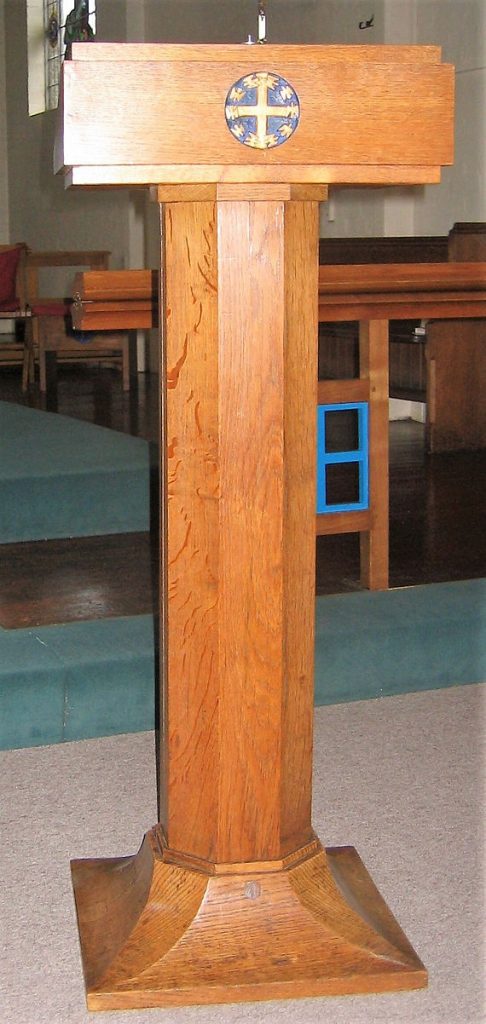St Francis, Honicknowle

The church of St Francis at Honicknowle was built in 1939 and designed by Paul Paget and John Seely (Western Morning News, 1939a), who are better known for much more prestigious work, such as Eltham Court. They also designed some of the church furnishings, which a newspaper article described as being ‘in the modern very severe style… largely dependent on the markings of the grain for decoration’ (Western Morning News, 1939b p. 3). Some of the furnishings designed by Seely and Paget are shown in photographs at PWDRO, but further items (and more information on known items) came to light in 2019 in an account of the early years of the Church written by its first incumbent the Revd Harry L. Franklin.
Stand and Font – Photograph (PWDRO 244/6) J. Seeley and P. Paget architects; 1939
The font is rather small and more like a holy water stoup. It was the gift of St Francis, Sidmouth, the only other Church in Devon dedicated to that saint (Franklin, c.1942). The font was not evident during a visit in 2013. The stand is no longer used to hold a font but serves as the base for a statue of the Madonna and Child (not Pinwill work).
Lectern – Photograph (PWDRO 244/6) J. Seeley and P. Paget architects; 1939
The lectern was presented by St Andrew’s Church, Plymouth (Franklin, c.1942), and is still in use.
Clergy/Priest’s Stall – Photograph (PWDRO 244/6) J. Seeley and P. Paget architects; 1939
According to a church warden, the clergy stall was destroyed and placed in a skip during the incumbency of a previous vicar, who decided it was no longer needed.
Statue of Christ Child – Franklin (c.1942); 1939
This is a very special find, as it represents the seventh such statue of the Christ Child carved by V. Pinwill. In his account of the early years of St Francis Church, the Revd Franklin wrote ‘The statue of the Christ Child is the gift and work of Miss V. Pinwill’. The fact that it was a gift underlines the joy that must have been felt across Plymouth that a new church was being established at a time of impending war. At present, it is not known whether the statue is still at the church.
Bishop’s Chair – Franklin (c.1942); 1939
A Bishop’s Chair is also listed by the Revd Franklin as being made by V. Pinwill for the new church. It was the gift of the Hon. Hilaria St Aubyn and bears the Arms of the See of Exeter. Whether this piece is still at the church is not known.
Server’s Stools – Franklin (c.1942); 1939
The Revd Franklin also lists a pair of Server’s Stools as being made by V. Pinwill. One was given by Sister Jane of the Oxford Mission to Calcutta and bears the emblem of the Mission. The other was the gift of the parents of Anthony Aiden in thanks for his birth and carries a carving of St Aiden. These chairs may or may not still be at the church.
Statue of St Francis – Private Communication (2019); 1939
It is evident from the booklet about the early days of the church at Honicknowle that the Revd Harry Franklin was an Anglo-Catholic who had a strong devotion to St Francis. At the start of his work at Honicknowle, he commissioned from Violet Pinwill a statue of St Francis for his private use. When he left Devon, the statue went with him and after his death was given by his widow to a close friend. The statue has now been given to the author for safe keeping. How well the Revd Franklin knew Violet Pinwill is not known. He could merely have known of her work through the furnishing of his church but there is reason to think there was more of a connection, as Violet’s name as the carver of the statue has passed down the years to the present day.
Sources
Franklin, H.L. (c.1942) Franciscan Days: dedicated to countless souls who love little St. Francis Church, Honicknowle.
PWDRO 244/6 Photographs. Various. Woodcarvings.
Western Morning News (1939a) Churches in New Areas. Plymouth Needs. Foundation-Stone Laying. Bishop of Exeter at Honicknowle. 29 May p. 2.
Western Morning News (1939b) Fights for Rights of Weak. Bishop of Exeter on Justice. Chapel Dedicated at Honicknowle. 18 September p. 3.